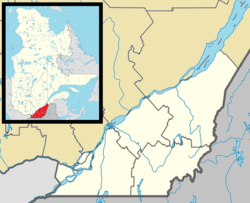Levis, Quebec
| Lévis | |||
|---|---|---|---|
| City | |||
| Ville de Lévis | |||

Lévis as seen from Terrasse Dufferin
|
|||
|
|||
| Motto: Toujours à l'Avant-Garde | |||
 Location with surrounding municipalities. |
|||
| Location in southern Quebec. | |||
| Coordinates: 46°48′N 71°11′W / 46.800°N 71.183°WCoordinates: 46°48′N 71°11′W / 46.800°N 71.183°W | |||
| Country |
|
||
| Province |
|
||
| Region | Chaudière-Appalaches | ||
| RCM | None | ||
| Constituted | January 1, 2002 | ||
| Boroughs | |||
| Government | |||
| • Type | Lévis City Council | ||
| • Mayor | Gilles Lehouillier | ||
| • MPs |
Steven Blaney (C) Jacques Gourde (C) |
||
| • MNAs |
François Paradis (C) Marc Picard (C) Dominique Vien (L) |
||
| Area | |||
| • Total | 497.00 km2 (191.89 sq mi) | ||
| • Land | 449.31 km2 (173.48 sq mi) | ||
| Population (2011) | |||
| • Total | 138,769 | ||
| • Density | 308.8/km2 (800/sq mi) | ||
| • Pop 2006-2011 |
|
||
| • Dwellings | 59,024 | ||
| Time zone | EST (UTC−5) | ||
| • Summer (DST) | EDT (UTC−4) | ||
| Postal code(s) | G6V to G6Z, G7A | ||
| Area code(s) | 418 and 581 | ||
| Website | www |
||
Lévis is a city in eastern Quebec, Canada. It is located on the south shore of the St. Lawrence River, opposite Quebec City. A ferry links Old Quebec with Old Lévis, and two bridges, the Quebec Bridge and the Pierre Laporte Bridge, connect western Lévis with Quebec City.
The population in July 2015 was 144,147. Its current incarnation was founded on January 1, 2002, as the result of a merger among ten cities, including the older city of Lévis founded in 1861.
Lévis is also the name of a territory equivalent to a regional county municipality (TE) and census division (CD) of Quebec, coextensive with the city of Lévis. Its geographical code is 25 as a census division, and 251 as an RCM-equivalent territory.
First Nations people are said to have favoured the Pointe-Lévy (currently named Lévis) area long before French settlement due to its ideal location, at the junction of the St-Lawrence and the Chaudière rivers. Many archeological sites reveal evidence of human occupation for about 10,000 years. Some historians theorize that Pointe-Lévy could have been one of the main centres of Native American population development in the Quebec province.
In 1636, approximately 28 years after the foundation of Quebec City, The seignory of Lauzon was founded on the eastern part of the actual territory. In the following years, other seignories were founded near the St-Lawrence river. Pointe-Lévy was mainly an agricultural domain in which several lords ("Seigneurs") controlled their part of land in a medieval feodal way.
The land of the Lauzon seignory remained unoccupied until 1647, when Guillaume Couture became the first European settler installed in front of Quebec City. Couture was at the time first Administrator, Chief Magistrate, Captain of the Militia, member of the Sovereign Council and was widely considered a hero in New France. Couture was however not the first seignor of the Lauzon Seignory, as the land was owned by Jean de Lauzon (French Governor between 1651 and 1657).
...
Wikipedia



